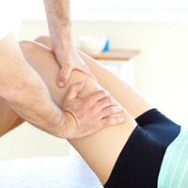 f you’ve been diagnosed with lupus, you will probably have to cope with lupus-related pain at some point in the course of your disease. Ninety percent of lupus patients experience some joint or muscle pain, commonly caused by inflammation of the joints.
f you’ve been diagnosed with lupus, you will probably have to cope with lupus-related pain at some point in the course of your disease. Ninety percent of lupus patients experience some joint or muscle pain, commonly caused by inflammation of the joints.
Lupus pain is different from other types of pain because its source and solution are often not that obvious. Lupus is a systemic disease, and pain symptoms, like other lupus symptoms, tend to wax and wane. Stress may also play a larger role in triggering pain related to lupus than it would for other conditions.
Types of Lupus Pain
Types of Lupus Pain
Pain can affect lupus patients in the following ways:
Arthritis. This type of swelling of the joints is common in lupus patients. Symptoms include pain, tenderness, stiffness, and warmth. Lupus usually causes arthritis in joints on both sides of the body and commonly affects fingers, wrists, elbows, knees, and toes. Stiffness is worse in the morning and gets better as the day goes on. Fibromyalgia. As many as 30 percent of lupus patients may also have fibromyalgia, a condition that causes chronic muscle and joint pain. The cause of fibromyalgia is not yet known but it can also lead to fatigue, joint and muscle pain, and stiffness. Lupus myositis. Lupus patients can have inflammation of the muscles that move bones, called “skeletal muscles.” This can cause pain and muscle weakness. Lupus headache. About 20 percent of people with lupus experience severe, migraine-like headaches.
Medical Treatments for Lupus Pain
“Anti-inflammatory medications such as salicylates, NSAIDs, and corticosteroids help with pain and inflammation,” says Amita Bishnoi, MD, a rheumatologist at Henry Ford Hospital, in Detroit. Your doctor may recommend one or more of the following medicines to help you manage your lupus pain:
Non-steroidal anti-inflammatory drugs (NSAIDs). These are the most commonly used medications for lupus pain. They include aspirin, naproxen, and ibuprofen.
Antimalarials. Two types of antimalarial drugs, hydroxychloroquine and chloroquine, combined with other medications, may be used to treat joint pain. These drugs may also help prevent lupus flares.
Corticosteroids. These medications can be used to control severe arthritis and are considered the best drugs for treating pain caused by lupus myositis. Corticosteroids may also help control lupus headaches.
Belimumab. This drug was approved to treat people with active lupus in 2011. It is the first new drug approved for lupus since 1955. It may prevent lupus pain by preventing severe lupus flares.
A 2011 study published in the journal Annals of the Rheumatic Diseases, involving 1,684 patients with active lupus, compared belimumab plus standard therapy to standard therapy alone. The patients taking belimumab along with standard therapy had less disease activity than the other group.
Other Lupus Pain Management Options
“Some patients who have chronic pain that is not responding to medications should consider consultation with a pain management specialist. Some non-medical treatments for pain can also be useful, including acupuncture, biofeedback, massage, and physical therapy,” advises Dr. Bishnoi. Moist heat may often help relieve joint or muscle pain. A moist heated towel, hot shower, hot bath, or whirlpool are some options. Other pain management options include:
Physical therapy. Physical and occupational therapy can help control lupus pain through exercises designed to keep muscles strong and to maintain the full motion of your joints. Physical therapy can also teach you ways to protect your joints from injury.
Mind-body techniques. These treatments take advantage of your mind’s ability to influence physical symptoms. Breathing exercises, relaxation training, and meditation are all good ways of lowering stress, which can be an important part of your pain management plan. Mind-body techniques that combine exercise and meditation, like tai chi and low-impact yoga, may also be helpful.
Massage. This treatment can be very relaxing and soothing, but it’s important to tell the massage therapist about your lupus diagnosis first. Ideally, the therapist should have experience working with lupus patients.
Acupuncture. This ancient treatment has been used for nearly 2,500 years to help people manage a variety of health ailments. The National Institutes of Health has concluded that acupuncture is effective in relieving many types of pain including pain related to fibromyalgia.
Keeps You From Working?
If you have lupus-related pain that makes it hard for you to stay at your job, you need to know about your rights under the Americans With Disabilities Act (ADA). You are considered to have a lupus-related disability if your lupus symptoms cause one or more physical or mental impairments that substantially limit the major life activities you’re able to engage in.
Talk to your employer about your lupus. The ADA requires your employer to make reasonable adjustments to your work environment to accommodate your health needs, if possible. This may include restructuring your job duties, changing your work schedule, or finding a different position for you within the company. If you want more information on the ADA, go to the U.S. Department of Justice Americans With Disabilities Act Web page.
If you can no longer work — even with reasonable accommodations — you may need to consider filing for disability. There are two programs that may apply to your situation: The Social Security disability insurance program pays benefits if you have paid into Social Security long enough, and the Supplemental Security Income program pays benefits to disabled adults who have limited resources. Contact your local Social Security Office for help.
Even though 9 out of 10 lupus patients will have to cope with lupus-related pain, doctors have many options for managing it. Always let your doctor know when pain symptoms flare up. And if pain is making it hard for you to keep up at work, remember that you do have legal options and rights..
No comments:
Post a Comment